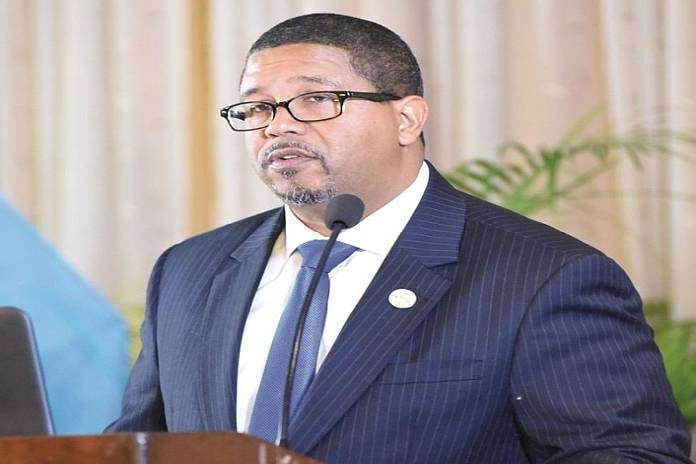By Paige McCartney
NASSAU, Bahamas — The Bahamas economy is “getting it on both ends” regarding its vulnerability to climate change and financial services sanctions, deputy prime minister Peter Turnquest told a meeting of the Global Forum on Transparency and Exchange of Information for Tax Purposes, in Paris, France.
The forum was created in the context of the Organisation for Economic Co-operation and Development’s (OECD) efforts to address the risks to tax compliance by non-cooperative jurisdictions.
The Bahamas is listed as largely compliant in the first and second round assessments on the exchange of information on request, with a commitment to the automatic exchange of information by 2020.
“Even as we talk about climate change again, the other pillar of our economy is tourism, which is 80 percent of our economy. So, you understand the vulnerabilities that we have. On the one hand we’re subject to climate change, which can wipe out 80 percent of our economy overnight; and we are faced with what we think is an unfair challenge to our legitimacy as a financial services destination by unfair labeling, so we’re getting it on both ends if you will,” Turnquest told the forum.
Turnquest was a part of a panel discussion, which included Switzerland’s State Secretary Daniela Stoffel, Ghana’s Deputy Minister of Revenue Kwaku Agyemang Kwarteng and Portugal’s Secretary of State of Tax Affairs Antonio Mendonca Mendes speaking on how tax transparency has transformed in The Bahamas over the past decade and the political pushback that was made.
“It was interesting to hear the comments earlier about climate change and how we look at climate change from a global perspective, and how we compensate the effects of developed countries or industrialized countries versus small, vulnerable states like ours that suffer the consequences of bad actors globally. And from a finance perspective, this is a constant tussle as we try to strike the right balance between investments in resilience-building pre-storm versus recovery following a storm,” he said.
“This leads us into the conversation we’re having today about tax, about having resources available to invest in things like resilience building. As you rightly mentioned, financial services represent 15 percent of our GDP… We’re celebrating 20-25 percent of offshore deposits now being repatriated back onshore. While that is something to be celebrated, we must also recognize that it means there is less business in international financial centers like mine, which translates into less taxes for me, for my country.
“So this is a mixed bag for us on the receiving end.”
Turnquest also challenged the notion of offshore versus onshore financial centers and highlighted The Bahamas’ commitment to ensuring transparency and a level playing field.
“Because that distinction, certainly in the case of The Bahamas, has been eliminated because we have passed legislation that now makes international business and international account holders on equal footing with domestic account holders. There is no difference, which has been a bit of a competitive disadvantage for us as we were able to offer some incentives in order to locate and have the professionals in The Bahamas manage wealth, but nonetheless that is a part of the commitment that we have made to the global community, that we will be transparent, we will eliminate any unfair or perceived unfair advantages and do our part to ensure that the agenda of a level playing field is advanced,” he said.
“Unfortunately, The Bahamas and countries like ours have been labeled as low tax or no tax, some say tax haven moniker, which we can’t seem to shake. All of us in the global community have some period in our past that we are not proud of, but we cannot continue to be labeled as such, but be recognized for the advances and progress that we are all making to improve our overall systems. We in The Bahamas and other international financial centers seek the same respect and recognition of the sacrifices that we’ve made in order to be seen as equal partners in the fight against tax evasion, against base erosion.”
The commitment of The Bahamas to meet international tax standards, Turnquest said, has resulted in a significant political effort over a series of administrations, with the high cost of compliance placing challenges on the country’s financial as well as human capital resources.
“There is no doubt that The Bahamas has been committed, we’ve passed a whole suite of legislation just in the past year with respect to substance requirements, the elimination of preferential treatment, we’ve made tax evasion a crime under the penal code. So, we’re making progress, but it has not been without challenges and it has not been without a direct threat to our economic base,” he told the forum.
Republished with permission of the Nassau Guardian





